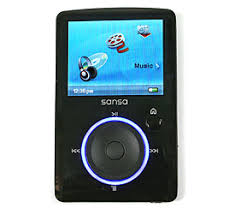 A long time ago, I bought a Sansa Fuze Mp3 player (as it was half of the price of the iPod with the same amount of memory). It has lasted several years with moderate usage, it has lived through some very extreme environmental conditions, and it’s still working to this day.
A long time ago, I bought a Sansa Fuze Mp3 player (as it was half of the price of the iPod with the same amount of memory). It has lasted several years with moderate usage, it has lived through some very extreme environmental conditions, and it’s still working to this day.
Side Note: I’m also a fan of how SanDisk does business: the Mp3 player just acts like a folder when docked to your computer (so you can just ‘click’ and ‘drag’ to add new songs…no need to work through a software like iTunes).
Honestly, it has been a great little Mp3 player, but it has some quirks that drive me crazy!!!
- First of all, when you’re trying to move within your song list, you have to spin the wheel to advance to the next song (you can’t just click ‘down’ or ‘up’).
- Secondly, there is no way to jump to ‘fast scroll mode’. If you want something in the middle of the alphabet, you have to scroll, scroll, scroll until you get there (I wish you could just press and hold)!!!
- Thirdly, you cannot loop around the alphabet (as in, if you want to get from ‘a’ to ‘x’, you have to scroll, scroll, scroll through ‘a’, ‘b’, ‘c’,… all the way to ‘x’. You cannot just go backwards from ‘a’ to ‘z’ to ‘y’ to ‘x’).
- Finally, you cannot create a playlist on the go. They provide you with a “go list”, which is one pre-named playlist to which you can add a (small) limited amount of songs, but you cannot create a second playlist without hooking the Fuze up to a computer.
Now, the thing that drives me crazy about these little deficiencies are that they can all be alleviated with software, they require no additional hardware whatsoever!!!
Hardware costs money, and some companies have limited cash, so I understand why some companies use cheaper components in their products (I don’t necessarily agree with it all of the time, but I understand it).
The thing about software is that there are only two things that separate the great from the mediocre: time and intelligence (and neither of these should be in short supply)!
(Now, before someone gets on my case, I know we all have deadlines we need to hit in order to keep up our freshness index, but, if we are in too much of a hurry, we will end up producing a far inferior product that annoys people (anyone else cram for tests in High School/College?!?). Also, I know that your software abilities are limited by the chips on which your software is running, but these chips are cheap compared to most of your hardware components).
Therefore, with this in mind, I really see a strong link between software and overall quality of the product and the company which the product represents. If there are bugs, poorly designed features, or broken links on web pages, it speaks volumes more to me about quality than a cheap part used in an assembly.
I get that your company may not always be able to afford better quality parts, but how can your company not afford to simply pay attention?
 This has long been a pet peeve of mine…
This has long been a pet peeve of mine…


